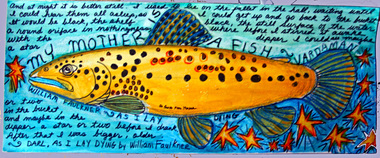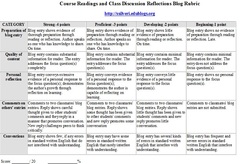 Each student has been assigned a topic (you will find your name in the list at the bottom of the page). 1. After reading As I Lay Dying, you will respond to your assigned prompt in a 400-550 word informal response. 2. Once you have posted your informal response as a blog entry (I suggest typing on a word document and then copy/pasting into the blog entry box - ADD WORD COUNT AT END OF RESPONSE), you will then read all of your colleagues' entries. 3. You will then respond to 2 colleagues' entries (each in a different topic from yours and from each other) in 100-150 word informal responses. This is similar to the usual blog entries that we have completed, except that you will discussing and responding to different topics. This is an important activity and, done correctly, will expose you to at least three different lens analyses of As I Lay Dying. In light of the importance of this activity, I will be counting this assignment as a 200 point Summative Assessment (100 points for Primary Responses and 50 points each for Secondary Responses). The Due Dates are: -Primary Responses must be completed by Sunday, May 4th at midnight. -Secondary Responses must be completed by Tuesday, May 6th at midnight. Topics: 1. Family and Honor - Samantha, Abigail, Edgar, Jahnai As I Lay Dying could be read as a metaphor for any family; the Bundrens are stuck together on a long journey, to help or hurt each other. The conflicts between feelings of desire, love, honor, and a longing for identity outside the family eventually lead to disaster. How do the Bundrens exemplify "family values?" How do they fail to? Does Faulkner see the Bundrens as a typical American family? (Are most people like this?) Do you? 2. Religion - Nathaniel, Cynthia, Akwasi The religious characters in the book (Whitfield, Cora) have very little positive impact on the Bundrens. Addie explicitly rejects religion after her affair with Whitfield. Cora uses her religious outlook chiefly as a way to judge and criticize the impoverished and low-class Bundrens. Anse often quotes scripture to justify his own selfish actions. Do you agree with Faulkner’s depiction of religion in modern life? If so, build upon it. If not, create a counter-argument. 3. Mortality and Ritual - Brittani, Thomas, Arvinda To the ancient Greeks, burial ritual was an extremely important religious task, representative of the loyalty a person has engendered in his family in life. Agamemnon speaks from hell to Odysseus: "As I lay dying, the woman with the dog's eyes would not close my eyes as I descended into Hades." He is referring to his wife Clytemnestra, whom conspired to murder him. Do the Bundrens betray Addie, or do they honor her? Does Addie betray them by asking Anse to make the journey to Jefferson? Does it matter what happens to our bodies after we die? 4. Sanity - Elizabeth, Nicole, Denean “Sometimes I think it aint none of us pure crazy and aint none of us pure sane,” says Cash. He then decides that if a person acts without thinking about how his actions affect other people, he is crazy. Do you agree with Cash? Are we all a little crazy? How does society use the word “crazy”—or even “mental illness”— to define people? Does Darl deserve his fate? How are Darl's "special powers" of narration related to what happens to him? 5. Perspective - Maricarmen, Stephanie, Patricia Comment on the multiple perspectives of the novel. What do we learn cumulatively about the characters through their various voices? What is the effect of these shifts in view? Which is the truer perspective of ourselves: the one from our eyes or from the eyes of others? You may analyze in depth one voice, or contrast two opposing voices (Darl and Jewel, for example). 6. Desire - Shayna, Kayla, Abril All of the family members use their mother’s burial as an excuse to go to town in order to acquire something. Which desires are more sympathetic, and which are less so? Is this a betrayal of Addie? Do our modern desires for material goods come between us and those we love? 7. Symbolism - Julie, Thalia, Adam Faulkner's shifting voices often finds commonality in elemental natural symbols: water, fire, horse, earth, sky, eye, wood, bird, etc. Choose one or more of these and make a unified comment on the symbol's ties to an allusion, perspective, insight, comment, or traditional generic convention.  "The Lady With the Little Dog" "The Lady With the Little Dog" "You abuse me for objectivity, calling it indifference to good and evil, lack of ideals and ideas, and so on. You would have me, when I describe horse-thieves, say: "Stealing horses is an evil." But that has been known for ages without my saying so. Let the jury judge them; it's my job simply to show what sort of people they are. I write: You are dealing with horse-thieves, so let me tell you that they are not beggars but well-fed people, that they are people of a special cult, and that horse-stealing is not simply theft but a passion. Of course it would be pleasant to combine art with a sermon, but for me personally it is extremely difficult and almost impossible, owing to the condition of the technique. You see, to depict horse-thieves in seven hundred lines I must all the time speak and think in their tone and feel in their spirit, otherwise, if I introduce subjectivity, the image becomes blurred and the story will not be as compact as all short stories ought to be. When I write, I reckon entirely upon the reader to add for himself the subjective elements that are lacking in the story." From a letter to Alekseys S. Suvorin in Letters on the Short Story, the Drama, and Other Literary Topics by Anton Chekhov After reading the excerpt above, please respond to the following prompt: Why does Chekhov reject sermonizing in his fiction? How does his "objectivity" affect your reading of "The Lady with the Little Dog"? Part One Expectations (respond to the prompt above): 200-250 words, 2 quotes from the short story, minimal errors in grammar and usage, thoughtful and thorough writing. Please use the assigned "pen name" given to you in class Part Two Expectations (read everyone's first responses, select two that interest you, and respond to their ideas): 100-150 words EACH, minimal errors in grammar and usage, thoughtful and thorough writing. Please use the assigned "pen name" given to you in class. |
Blog Post Rubric
Archives
February 2023
Categories
All
|
 RSS Feed
RSS Feed